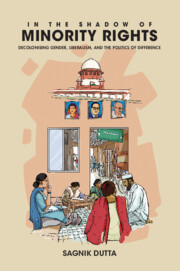Introduction
Published online by Cambridge University Press: 15 March 2025
Summary
In a small, rectangular dimly lit room, Khatun Shaikh, a female qazi (Islamic judge) in a women's sharia court, lent a patient ear to women who approached her with complaints of marital discord and violence. The sharia court is an alternative dispute resolution forum run by members of the Bharatiya Muslim Mahila Andolan (Indian Muslim Women's Movement, henceforth BMMA), a social movement led by Muslim women aimed at achieving equality and justice in the adjudication of Muslim family law in India. These alternative forums were frequented by women from poor neighbourhoods in Mumbai who did not have the wherewithal to access the formal justice system. As cases of marriage, divorce, maintenance and domestic violence were discussed and debated in these forums, quarrels broke out between the spouses and their relatives. Allegations of abuse and counter-allegations flew thick and fast. In the midst of these heated exchanges between spouses, Shaikh often emphasised the importance of raham (compassion) as an everyday, lived ethical ideal that both the spouses ought to practice. While the disputes revolved around women claiming specific rights during and after the breakdown of their marriage, Shaikh insisted on how both men and women needed to be compassionate. According to Shaikh, one could display compassion in moments of crisis in the marriage by avoiding the use of harsh words, refraining from overt displays of anger and addressing each other respectfully. This practice of compassion thus entailed using the body in specific ways while claiming one's rights. Shaikh construed compassion as a lived ideal that resonated with the teachings of the Quran and the life of the Prophet. The pursuit of this ideal was closely tethered to the realisation of equality (barabari) and justice (insaf) in the domain of the family.
The sharia court emerged as a space of self-making for both the activists of the BMMA and the women visiting the court. Women spoke their mind. They spoke about the violence and injustice in the family. Interactions between activists, lawyers and the women who visited these forums helped in creating a supportive community space for women who faced injustice in their marital homes. On some days, the court room also doubled as a space where activists of the BMMA conducted training sessions on Muslim family law, the Quran and the Constitution for women of the neighbourhood.
- Type
- Chapter
- Information
- In the Shadow of Minority RightsDecolonising Gender, Liberalism and the Politics of Difference, pp. 1 - 46Publisher: Cambridge University PressPrint publication year: 2025

